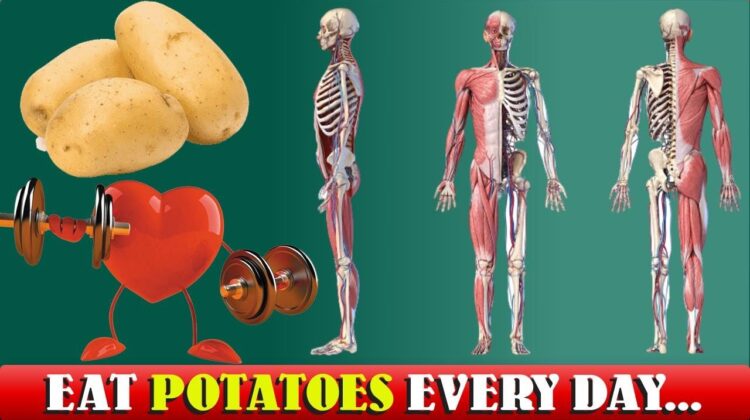
Potatoes are one of the most beloved vegetables in the world, making their way into countless dishes, from crispy French fries to creamy mashed potatoes. But what happens when you eat potatoes every day? Is it healthy to include this starchy vegetable in your daily diet? While some worry about weight gain or blood sugar spikes, others praise potatoes for their impressive nutrient profile. Let’s dive into the truth about consuming potatoes daily, the benefits, potential risks, and the healthiest ways to enjoy them.
Nutrients in Potatoes Beyond Carbohydrates
A common misconception is that potatoes are nothing more than a source of carbohydrates. However, they offer a variety of essential nutrients:
- Potassium: Potatoes are an excellent source of potassium, which helps regulate blood pressure and muscle function.
- Vitamin C: This antioxidant boosts immunity and improves skin health.
- Fiber: Found mainly in the skin, fiber supports digestion and gut health.
- Magnesium, Iron, and Zinc: These minerals contribute to bone health, energy production, and immune function.
- B Vitamins: Potatoes contain B6, which supports brain health and helps the body produce neurotransmitters.
By eating potatoes every day in moderation, you can take advantage of these essential nutrients while enjoying a filling and satisfying food source.
How Eating Potatoes Daily Affects Your Health
1. Supports Bone Health
Potatoes contain calcium, magnesium, and zinc, all of which contribute to strong bones. While dairy is a well-known source of calcium, adding potatoes to your diet can provide a plant-based way to support bone strength.
2. Good for Heart Health
Many assume that potatoes contribute to cholesterol-related issues, but in reality, plain potatoes contain no cholesterol at all. The problem arises when potatoes are deep-fried or covered in butter and cheese. When eaten in their natural form, potatoes offer:
- Fiber: Helps lower bad cholesterol levels.
- Potassium: Helps regulate heart function and blood pressure.
- Vitamin B6: Supports cardiovascular health by reducing inflammation.
3. Regulates Blood Pressure
A high sodium intake is one of the primary causes of high blood pressure. Luckily, potatoes are naturally low in sodium while being rich in potassium, which helps relax blood vessels and improve circulation. Additionally, the magnesium and calcium in potatoes further support normal blood pressure levels.
4. Aids Digestion and Gut Health
Fiber is crucial for maintaining a healthy digestive system, and potatoes contain both soluble and insoluble fiber. Eating potatoes every day, especially with the skin, can promote regular bowel movements and support gut bacteria.
5. Boosts Immunity and Skin Health
Vitamin C in potatoes plays a significant role in strengthening the immune system and promoting collagen production, essential for skin elasticity and wound healing.
6. Provides Energy and Satiety
Because potatoes are high in complex carbohydrates, they serve as an excellent energy source. They keep you full for longer, making them a great option for those looking to maintain energy levels throughout the day.
Should You Eat Potatoes Every Day?
The answer is yes, but with portion control. While potatoes are nutritious, overconsumption—especially of fried or heavily processed potato products—can lead to weight gain and other health concerns. Here’s how to safely include them in your daily diet:
- Stick to a medium-sized potato per day (roughly the size of a computer mouse).
- Avoid deep frying or excessive use of butter and cheese.
- Combine potatoes with high-protein foods (like beans, chicken, or fish) for a balanced meal.
- Opt for baking, roasting, steaming, or boiling instead of frying.
Healthy Ways to Eat Potatoes Every Day
If you love potatoes but want to enjoy them in a healthy manner, try these preparation methods:
1. Baked Potatoes
Baking a potato with its skin retains the most nutrients. Add herbs, Greek yogurt, or a sprinkle of cheese for flavor without excessive calories.
2. Mashed Potatoes (Without Butter & Cream)
Instead of heavy cream and butter, mash potatoes with low-fat milk, olive oil, or Greek yogurt for a creamy texture without extra fat.
3. Roasted Potatoes
Toss small potato cubes with olive oil, garlic, and herbs, then roast for a crispy yet healthy side dish.
4. Boiled Potatoes
Simple boiled potatoes can be seasoned with olive oil, salt, pepper, and lemon for a refreshing dish.
5. Potato Salad (Without Mayo)
Use a light vinaigrette or Greek yogurt instead of mayonnaise to make a healthier potato salad.
6. Stir-Fried Potatoes
Lightly stir-fry potatoes with minimal oil and plenty of vegetables to create a nutritious dish.
Common Mistakes to Avoid When Eating Potatoes Daily
Many people make mistakes when incorporating potatoes into their diets. Avoid the following:
- Eating Deep-Fried Potatoes Too Often: French fries and chips are tasty but loaded with unhealthy fats.
- Overeating Processed Potato Products: Instant mashed potatoes, potato chips, and frozen fries contain preservatives and excess sodium.
- Ignoring Portion Control: Stick to a moderate portion to prevent excessive calorie intake.
- Not Eating the Skin: The skin contains fiber and essential minerals, so wash and eat it whenever possible.
Final Thoughts
Eating potatoes every day can be beneficial for your health—provided they are consumed in a healthy way. Packed with essential nutrients like potassium, fiber, and vitamin C, potatoes contribute to heart health, digestion, and energy levels. However, portion control and cooking methods play a crucial role in determining whether potatoes support or hinder your health goals.
To enjoy the benefits of eating potatoes daily, avoid deep-fried or overly processed forms and opt for healthier cooking methods like baking, roasting, or boiling. When eaten in moderation, potatoes can be a nutritious addition to a balanced diet without negative effects on weight or blood sugar levels.
Do you eat potatoes every day? Let us know in the comments how you include them in your diet! And if you found this article helpful, share it with your friends and family.
Leave a Reply